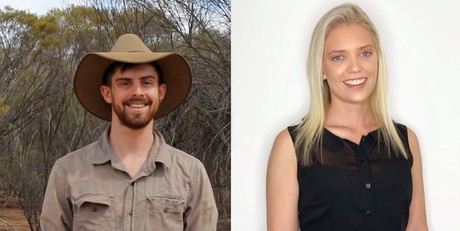Academy recognises two Australian environmental scientists

Dr Tim Doherty from Deakin University and PhD student Nicole Foster from the University of Adelaide have been awarded the 2019 Australian Academy of Science Max Day Environmental Science Fellowship Award.
The award provides up to $20,000 for early-career researchers working on the conservation of Australia’s flora and fauna, the ecologically sustainable use of resources and the protection of the environment and ecosystem services.
Dr Doherty will use the award to study the environmental consequences of removing the predators of the large native Australian monitor lizard, Varanus gouldii. Also known as the racehorse or sand goanna, it can cover up to 20 km/hour. The research will be conducted at Wild Deserts — a fauna reconstruction project at Sturt National Park in north-west New South Wales. Two 20 km2 fenced enclosures have been constructed from which introduced cats and foxes will be eradicated by early 2019.
“We will obtain baseline data on goannas inside the fenced predator-free ecosystem before ecosystem changes accumulate such as increased plant growth, the reintroduction of threatened mammals and changes in invertebrate communities,” Doherty said. “The project will determine how sand goannas change their movement behaviour and habitat use in response to the removal of mammalian predators, and also produce new knowledge on the ecological outcomes of erecting predator-free enclosures in Australia.”
Foster will use the award to study innovative approaches to the management of coastal environments. Foster will look at environmental DNA buried in sediment profiles of coastal environments to understand changes in coastal vegetation through time.
“Mangroves, salt marshes and sea grasses capture large amounts of carbon from the atmosphere and this actually helps to prevent global warming. They also provide a large amount of habitat for marine life and birds and stabilise the coastlines against erosion and storm events,” Foster said.
“Through this environmental DNA analysis we will be able to see what the natural state of this system is and then tailor conservation goals towards the natural environment.”
Three researchers ‘highly commended’ for the Max Day Environmental Science Fellowship Award are:
- Anita Perkins from Southern Cross University for her project — Fungi as degraders of kelp detritus: unravelling the role of fungi in coastal carbon cycling and storage.
- Dr Jose Lahoz-Monfort from the University of Melbourne for his project — Acoustic monitoring: new technologies and analytical tools for large-scale monitoring of the threatened Sarus crane.
- Dr Alexandra Carthey from Macquarie University for her project — Microbially-mediated olfactory communication in the Anthropocene: a key to the lockbox of problematic captive breeding for conservation?
The award is named in honour of Academy Fellow, the late Dr Maxwell Frank Cooper Day AO, who spent a lifetime championing entomology, conservation and forestry, as well as helping other scientists. He died last year aged 101.
Govt and industry fund health and biotech innovation in SEQ
The SEQ Innovation Economy Fund has awarded eight projects $94m in government funding, while...
Does the 2025–26 Budget do enough for science?
AAMRI has described the 2025–26 federal Budget as "very disappointing" for the...
Ming Long appointed Chair of CSIRO
Minister for Industry and Science Ed Husic has announced the appointment of Ming Long to the role...




